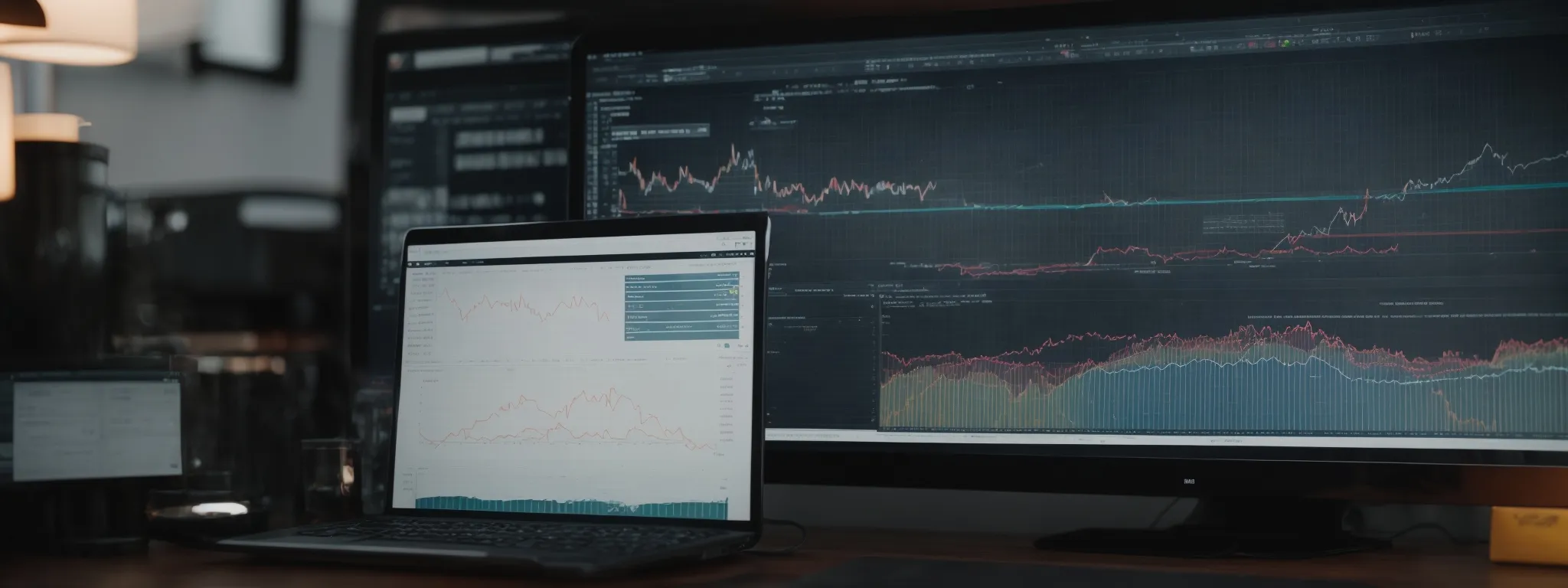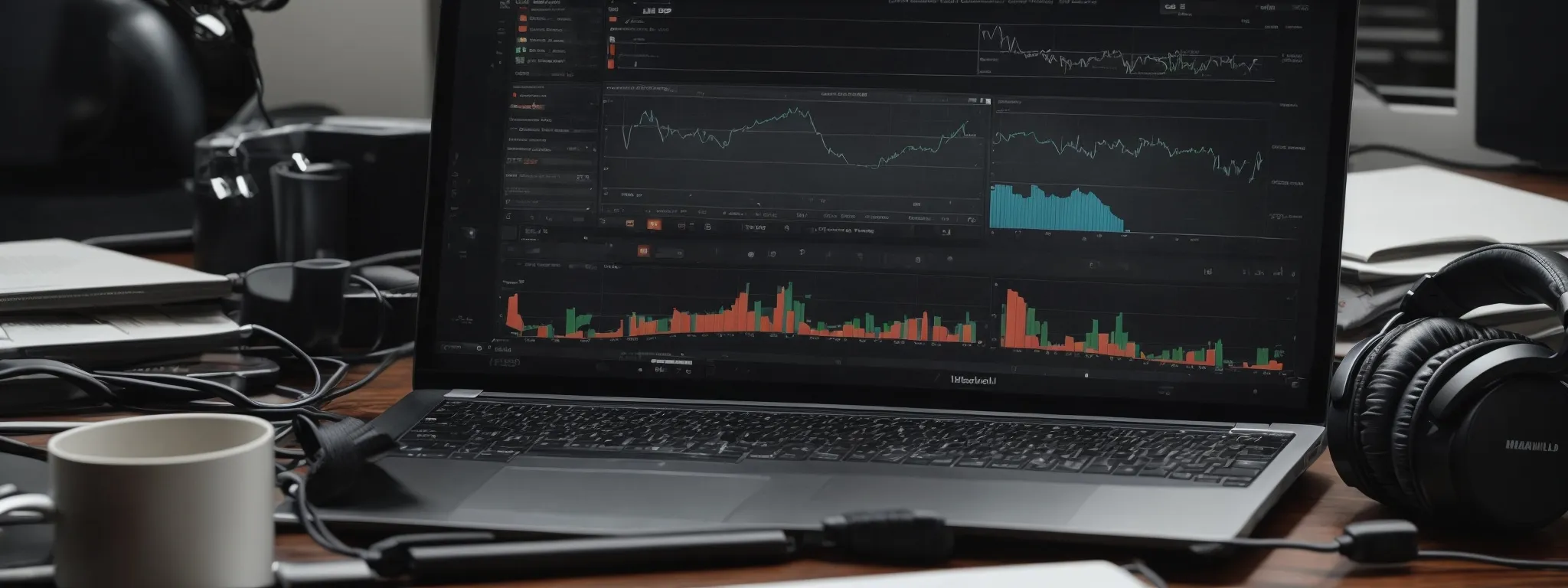SEO Experiments 2023: What’s Next?
SEO Experiments 2023: What’s Next? As the digital marketing landscape evolves, Search Engine Optimization (SEO) remains a cornerstone for successful online visibility. With 2023 upon us, it’s […]
SEO Experiments 2023: What’s Next?
As the digital marketing landscape evolves, Search Engine Optimization (SEO) remains a cornerstone for successful online visibility.
With 2023 upon us, it’s critical for SEO professionals and content marketers to anticipate and embrace the latest experimental techniques poised to shape the future of search.
From the integration of machine learning algorithms to innovative link-building approaches, SEO experiments are rapidly advancing, driven by a continuous quest for better rankings and enhanced user engagement.
LinkGraph, at the forefront of SEO optimization, meticulously crafts experiments aimed at propelling clients to the pinnacle of Google search results.
Continue on to uncover the cutting-edge SEO experiments that LinkGraph forecasts will elevate digital marketing strategies in 2023.
Key Takeaways
- LinkGraph Leverages Advanced SEO Techniques, Including the Use of SearchAtlas SEO Software and Predictive Analytics, to Improve Clients’ Search Engine Rankings
- Embracing Artificial Intelligence and Machine Learning Is Critical for SEO Strategies to Align With Search Engine Advancements and User Search Patterns
- A/B Testing and Data-Driven Experimentation Are Fundamental in Fine-Tuning SEO Strategies That Prioritize User Experience and Adapt to Algorithmic Changes
- The Relationship Between Social Media Engagement and SEO Is Being Closely Examined for Its Indirect Effects on Improving Organic Search Visibility and Backlink Profiles
- Multimedia Optimization, Particularly Video Content and Podcasts, Is Becoming Increasingly Important for Capturing Audience Attention and Enhancing SEO Efforts
Unveiling the Future of SEO Experiments in 2023

In an era punctuated by rapid digital transformation, SEO stands as a critical determinant in the online visibility of brands, products, and services.
With businesses vying for prime real estate on Google’s ever-evolving search landscape, the quest for the most effective Search Engine Optimization strategies intensifies.
2023 ushers in a new wave of SEO experiments, each promising to demystify the algorithms that govern our online experience.
From exploring innovative testing methodologies that aim to understand every nuance of modern SEO to the ever-increasing influence of Artificial Intelligence on SEO tactics, experts at LinkGraph are at the forefront, harnessing data-driven insights to redefine what successful optimization looks like.
As companies embark on these digital endeavors, recognizing the underlying objectives and potential of SEO experiments becomes essential to building a resilient and adaptive digital marketing strategy.
Understanding the Premise of Modern SEO Testing
Modern SEO testing hinges on the Meticulous Analysis of Factors influencing SERP rankings. SEO experts from LinkGraph employ this testing to isolate variables like meta descriptions, keyword density, and page speed, creating controlled conditions to track and measure their individual impact on search performance.
This empirical approach to SEO enables practitioners to draw informed conclusions about the effectiveness of specific strategies. LinkGraph’s utilization of the SearchAtlas SEO Software, for instance, fosters a granular understanding of how changes to a web page translate to quantifiable SEO results: a breakthrough in optimization practices.
| SEO Factor | Tool Used | Impact Measured |
|---|---|---|
| Meta Descriptions | SearchAtlas SEO Software | Click-Through Rates |
| Keyword Density | SearchAtlas SEO Software | Organic Search Positioning |
| Page Speed | SearchAtlas SEO Software | User Experience Metrics |
Identifying the Primary Goals of SEO Experiments
At the core of SEO experiments lies the unyielding quest to enhance the efficacy of optimization strategies, thus bolstering a brand’s prominence in search engine rankings. LinkGraph adeptly navigates this complex terrain by setting clear objectives that aim to elevate page visibility and user engagement, ensuring clients outshine competitors in the digital arena.
LinkGraph’s Pioneering Experiments With SEO are meticulously designed to deconstruct the multitude of elements that fuel search engine algorithms, resulting in superior organic traffic and a commanding online presence. Each test is a step toward a meticulously tailored SEO strategy, informed by hard data and strategic analysis, indispensable for businesses aspiring to thrive in the contemporary search landscape.
The Role of Artificial Intelligence in Future SEO Tactics
The Integration of Artificial Intelligence into SEO tactics represents a transformative leap in optimizing digital content. Machines are now capable of parsing vast datasets at unprecedented speeds, offering insights into user behavior and algorithmic preferences that can revolutionize a brand’s SEO approach.
- Implementing Machine Learning algorithms to predict SEO trends and changes.
- Utilizing AI-driven content analysis for optimizing keyword relevance and density.
- Employing advanced AI tools for real-time SERP monitoring and strategy adjustment.
Artificial Intelligence also brings a new dimension of personalization to SEO, allowing strategies to be sharply aligned with individual user intent. This ensures that businesses cater to the specific needs and search patterns of their audience, leading to a more targeted and effective SEO campaign.
Pioneering SEO Techniques to Watch Out For

As the landscape of search engine optimization continually evolves, pioneering SEO techniques merit close attention.
Industry leaders and marketers must adapt to the tides of change, ensuring their digital presence not only remains competitive but sets the benchmark for innovation.
Two emergent areas poised to redefine SEO practices include the integration of predictive analytics and the nuances of voice search optimization.
These forays into advanced SEO experiments are not only reconfiguring existing approaches but establishing new opportunities for brands to connect with an audience whose behaviors and expectations are ever-shifting.
Implementing Emergent Technologies in SEO Strategies
The advent of emergent technologies has set the stage for pivotal developments within SEO strategies. LinkGraph seamlessly integrates these technologies, harnessing the power of advanced analytics and AI capabilities to propel clients’ content to the apex of search results.
Forging ahead, LinkGraph adopts cutting-edge tools such as SearchAtlas SEO Software, which employs sophisticated algorithms to refine search relevance and adapt to search engine behavioral shifts. This meticulous incorporation of technology streamlines the optimization process, delivering more precise and impactful SEO campaigns.
Predictive Analytics and SEO: A Budding Relationship
The dynamic alliance between Predictive Analytics and SEO epitomizes the nascent trend in search engine optimization’s progression. As businesses strive to anticipate market shifts, predictive models are gaining traction, offering the potential to project search patterns and user behavior with unprecedented precision.
LinkGraph stands at the vanguard, harnessing predictive analytics to provide clients with a strategic edge: the ability to forecast and adapt to algorithmic changes and user preferences before they manifest. This preemptive approach positions businesses not merely as participants but as pacesetters in the search engine hierarchy.
| SEO Element | Predictive Analytics Function | Advantage for SEO |
|---|---|---|
| Search Patterns | Trend Forecasting | Strategic Content Planning |
| User Behavior | Intent Prediction | Enhanced User Experience |
| Algorithmic Changes | Change Anticipation | Proactive Optimization |
Voice Search Optimization: The Untapped SEO Experiment
Voice Search Optimization stands as the untapped experiment within the spectrum of SEO practices, bearing significant potential to reshape how users engage with search engines. Nuanced in its requirements, voice search demands an acute focus on natural language processing and a move beyond traditional text-based queries.
The challenge of aligning SEO practices with the conversational tone and context-specific queries of voice search users presents an untapped opportunity for brands. LinkGraph recognizes this, innovating strategies to optimize for voice, understanding its pivotal role in driving the next surge of digital engagement.
| Aspect of Voice Search | Optimization Strategy | Expected Outcome |
|---|---|---|
| Conversational Queries | Natural Language Enhancement | Improved Voice Search Relevance |
| Contextual Understanding | Localized Content Optimization | Increased User Engagement |
Structuring Experiments for Maximum SEO Innovation

As the search for groundbreaking strategies in search engine optimization continues unabated, professionals within the field are harnessing the power of experimentation to innovate and thrive in an increasingly competitive digital ecosystem.
In 2023, the focus sharpens on structuring SEO experiments with refined precision, as industry experts at LinkGraph segue into new methodologies designed to explore the multifaceted nature of search engines.
The forthcoming sections will delve into the meticulous crafting of hypotheses tailored to test the impact of specific SEO variables, the careful establishment of control groups that provide unblemished data for comparative analysis, and the calibrating of metrics integral for discerning the success of these SEO endeavors.
Each step, orchestrated with strategic intent, lays the foundation for an era marked by advances in optimization techniques and an enhanced understanding of the search environment.
Crafting Hypotheses for SEO Variable Testing
As the echelons of LinkGraph disseminate wisdom on search engine optimization, experts forge hypotheses that serve as the bedrock of SEO variable testing. These probes into the digital unknown ascertain which on-page elements, from title tags to image alt text, exhibit the most commanding influence on search engine results pages (SERPs).
LinkGraph’s astute professionals engage in the meticulous design of these conjectures to address specific elements such as meta description efficacy or the impact of user experience on SEO outcomes. This disciplined approach to hypothesis formation sets the stage for targeted experiments that distill complex SEO phenomena into actionable insights.
Establishing Control Groups in SEO Experimentation
In the vibrant arena of SEO, setting up effective control groups is a critical step in the experiment process. LinkGraph’s seasoned experts meticulously select a subset of web pages to serve as benchmarks, providing a stable comparative backdrop as they administer and measure the potency of varying SEO tactics.
These control groups reveal the unbiased impact of interventions such as the implementation of novel keyword strategies or the restructuring of a website’s architecture. By observing the juxtaposition between the experimental group and the control, LinkGraph can discern the true efficacy of each SEO action with confidence:
| SEO Element Under Test | Control Group Characteristics | Measured SEO Outcome |
|---|---|---|
| Keyword Optimization | Web pages with baseline keyword distribution | Ranking and visibility shifts in SERPs |
| Site Architecture Adjustment | Pages maintaining traditional structure | User engagement and bounce rates |
LinkGraph’s approach to establishing control groups not only fortifies the rigor of their SEO experiments but also guarantees that the results attained are attributed solely to the variables being tested.
Metrics That Matter: Tracking SEO Experiment Success
Accurate Success Tracking is a cornerstone of SEO experimentation, and LinkGraph distinguishes itself by selecting the most indicative metrics for gauging the success of SEO experiments. Their focus lies on parameters like organic click-through rate (CTR), keyword rankings, and conversion rates — essential yardsticks that reflect whether an implemented SEO change serves its intended purpose.
Within the ambit of these experiments, LinkGraph meticulously correlates fluctuations in search engine result page performance with specific SEO actions, allowing for a robust assessment of strategy efficacy. By relying on such data-driven insights, the company ensures that SEO modifications lead to measurable improvements in client online visibility and engagement.
The Potential Impact of Machine Learning on SEO

As the digital landscape evolves, Search Engine Optimization must adapt to the increasing sophistication of artificial intelligence and machine learning that continuously redefine Google’s algorithm updates.
SEO researchers and practitioners are poised to embrace a new frontier in 2023, leveraging cutting-edge machine learning techniques, such as neural networks and semantic analysis, to enhance and predict search engine behaviors.
This progressive shift underscores the necessity for brands to understand and optimize in concert with advanced machine learning paradigms, ensuring that they remain relevant and highly visible in the fluid expanse of the search engine results pages (SERPs).
Google’s Algorithm Updates and Machine Learning Integration
With Google continuously refining its algorithm, LinkGraph recognizes the colossal role machine learning plays in shaping these updates. The company’s expertise lies in decoding the subtleties of algorithmic tweaks and translating these insights into robust SEO strategies that align with Google’s sophisticated machine learning capabilities.
As a result of this integration, LinkGraph not only stays ahead in understanding shifts in the search landscape but also equips clients to navigate the complexities of SEO with adept precision. This knowledge becomes particularly invaluable as businesses strive to maintain relevance amid the tide of machine learning-enhanced algorithm changes.
SEO Experiments With Neural Networks and Semantic Analysis
LinkGraph’s methodology for optimizing SEO experiments harnesses the advanced capabilities of neural networks, enabling a more profound understanding of how content interacts within the search ecosystem.
Through semantic analysis, LinkGraph deciphers the intricate web of context and relevance spun by search engines, fine-tuning client strategies to resonate more deeply with search algorithms and user intent.
Adapting to Machine Learning-Driven Search Engine Behaviors
In 2023, the impact of machine learning on SEO is palpable, compelling brands to adapt or risk obsolescence. LinkGraph’s approach to embracing machine learning-driven search engine behaviors involves the implementation of intelligent systems that can dynamically respond to algorithmic shifts, maximizing the relevance and visibility of client websites.
These developments necessitate a pivot in SEO strategies, where understanding and aligning with machine learning processes is no longer optional but imperative for success. LinkGraph equips its clients with the tools to thrive in this new environment, where search engines are increasingly adept at interpreting searcher intent and content quality:
- Employing AI to refine keyword research and ensure alignment with user search patterns.
- Optimizing content through sophisticated machine learning algorithms for greater SERP relevance.
- Monitoring algorithm updates to anticipate changes and adjust strategies in real-time.
Leveraging Data Science for SEO Experimentation

In the quest to penetrate the enigmatic depths of Search Engine Optimization, 2023 signals a pivotal turn towards the inclusion of data science in experimental pursuits.
Armed with vast repositories of information, industry professionals harness Big Data to form predictive SEO models, drawing back the curtain on future trends and patterns.
This analytical prowess extends to the customization of SEO strategies, where data mining emerges as a vital tool in tailoring approaches to unique business needs.
As LinkGraph explores this data-centric avenue, it further dedicates efforts to dissecting user behavior trends, yielding a richer, more intuitive understanding of SEO dynamics that align with evolving user interactions.
Big Data’s Role in SEO Prediction Models
In the arena of search engine optimization, Big Data emerges as a linchpin for crafting predictive SEO models. LinkGraph leverages vast data sets to discern patterns and predict outcomes, shaping SEO strategies that are both responsive and proactive.
By utilizing sophisticated algorithms to analyze search behaviors and outcomes from extensive data repositories, LinkGraph provides SEO services that anticipate shifts in the search landscape. This foresight empowers clients to stay one step ahead, ensuring their SEO campaigns are attuned to emerging trends and potential algorithmic changes:
| Data Analytic Dimension | Application in SEO | Benefit to Clients |
|---|---|---|
| Search Pattern Recognition | Modeling Search Behavior | Strategic Adaptation to Trends |
| Algorithmic Outcome Analysis | Predictive Strategy Development | Proactive Response to Changes |
Crafting Personalized SEO Strategies Through Data Mining
Data mining stands as a transformative force in constructing personalized SEO strategies. By delving into the intricate patterns of user engagement and interaction, LinkGraph crafts bespoke SEO campaigns that resonate with the target audience’s unique preferences and behaviors.
Through careful analysis of extensive datasets, LinkGraph identifies nuances in customer search queries and content engagement that inform tailored SEO solutions. Recognizing the singularity of each client’s digital footprint, LinkGraph utilizes data mining to ensure SEO tactics are not only data-driven but distinctly aligned with the goals and aspirations of the brand:
- Decoding the subtleties of user search behavior to optimize content visibility.
- Analyzing engagement metrics to refine targeting and personalization approaches.
- Tracking the user journey to tailor the SEO roadmap to real-time analytics.
Analyzing User Behavior Trends for Enhanced SEO Insights
In the realm of search engine optimization, analyzing user behavior trends is not merely advantageous; it’s paramount for insights that drive forward-thinking SEO tactics. LinkGraph customizes its platform to scrutinize these behavioral trends, delving into granular metrics such as page dwell time, navigation paths, and conversion funnel efficiency to empower businesses with actionable data.
This precise analysis allows for a strategic application of SEO initiatives: the company formulates strategies that directly address the propensities of its clients’ audience segments, leading to exceedingly relevant and engaging content that captivates visitors:
- Collating page interaction data to uncover engagement patterns.
- Inspecting conversion paths for optimization of the user’s journey.
- Adjusting content to mirror the consumption preferences of users.
Exploring the Efficacy of Multimedia SEO Experiments

In the riveting expanse of Search Engine Optimization experiments, 2023 beckons innovative modes of engagement, drawing the curtains on multimedia as a critical area of exploration.
The industry is briskly pacing towards optimizing video content, leveraging the potency of infographics for comprehensive storytelling, and piercing through the auditory digital space with podcasts.
Reflective of the shifting consumption preferences of users, these mediums present verdant grounds for SEO trials, where the potential for enhanced visibility and user engagement beckons.
Such multifaceted optimization efforts portend an evolution of SEO practices that may very well redefine the trajectories of digital marketing success.
Video Content Optimization: The SEO Frontier
At the heart of achieving a visible online presence, video content optimization emerges as a pioneering frontier in SEO experiments. Rapid advancements in digital consumption patterns have thrust video SEO into the limelight, positioning it as an indispensable element for brands looking to capture and retain the audience’s attention.
Properly optimized video content transcends traditional text-based SEO, offering LinkGraph clients an innovative medium through which to engage a broader demographic while simultaneously improving SERP standings. The optimization of video material for search engines demands a deep understanding of metadata, strategic keyword inclusion, and alignment with user search intent:
- Adjustment of meta titles and descriptions for enhanced video discoverability.
- Employment of transcriptions to cater to diverse user preferences and accessibility standards.
- Integration of appropriate tags and categorization for improved search relevance.
LinkGraph underscores the significance of multimedia SEO experiments with a spotlight on video content, enabling businesses to forge a competitive edge in a dynamic digital marketing landscape. By aligning video SEO with overarching content strategies, clients can leverage the full spectrum of SEO to drive traffic, increase engagement, and build brand authority.
Infographics and Visual Data: Their Place in SEO Trials
In the realm of SEO experiments, the Strategic Use of Infographics and visual data has gained prominence as a method to enhance user engagement while potentially boosting SERP standings. LinkGraph recognizes the inherent power of visual storytelling, adept at transforming complex data into compelling visual narratives that captivate viewers and elevate content’s shareability.
By integrating infographics within an SEO content strategy, LinkGraph meticulously optimizes these visuals for search engines, applying best practices such as using descriptive file names and ensuring the inclusion of keyword-rich alt text. This not only aids in visual content indexing but also enriches the user experience, potentially increasing the time spent on a web page:
- Creation of captivating infographics that simplify information transmission.
- Optimization of visual elements to improve online discoverability and reach.
- Implementation of a strategic distribution plan for visual content to maximize impact.
Podcast SEO: An Experiment Worth Tuning Into
Amid the diverse landscape of SEO, podcasting emerges as a burgeoning frontier, ripe with opportunities for innovative optimization. LinkGraph turns its focus to this auditory medium, unlocking the potential for podcasts to rank within SERPs and drive a unique, targeted stream of traffic to brands.
Optimizing podcasts for search engines involves a nuanced approach, intertwining relevant keywords within episode titles and descriptions to enhance discoverability. LinkGraph guides clients through strategic podcast SEO, ensuring their content resonates with both listeners and search algorithms.
| Podcast SEO Element | Optimization Strategy | Intended Benefit |
|---|---|---|
| Episode Titles | Inclusion of Target Keywords | Improved Search Visibility |
| Show Descriptions | Engaging, Keyword-Rich Narratives | Enhanced Discoverability and Relevance |
| Metadata Tags | Careful Tagging with Keywords | Direct Navigation to Content |
Mobile-First SEO: Experimenting for the Handheld Era

In the boundless pursuit of search engine prominence, the modern digital marketer must acknowledge the paramount importance of mobile-first strategies.
The advancement of Accelerated Mobile Pages (AMP) and their implications for SEO performance stand as a pivotal focus within this domain.
Similarly, the intricacies of Mobile User Experience (UX) interwoven with SEO practices demand meticulous attention to ensure seamless user engagement across devices.
Furthermore, the ascent of Progressive Web Apps (PWAs) emerges as a transformative element of SEO testing, potentially redefining the accessibility and efficiency of web interactions for the mobile-savvy public.
Each of these components converges to craft the groundbreaking narrative of Mobile-First SEO, charting new territories in the continual evolution of search engine optimization.
Accelerated Mobile Pages (AMP) and SEO Performance
In the competitive realm of mobile search, Accelerated Mobile Pages (AMP) stand as beacons of rapid information delivery, directly influencing SEO performance. As LinkGraph’s professionals hone in on AMP implementation, the typically swift loading times and streamlined user experience contribute to improved engagement and user retention, which are instrumental factors for climbing search rankings.
Through the strategic adoption of AMP within a comprehensive SEO strategy, LinkGraph ensures that mobile web pages not only gain favor with speed-conscious search algorithms but also meet the expectations of a mobile-first audience. This emphasis on speed and user experience via AMP integration is central to securing and maintaining a robust mobile search presence in the current search landscape.
Mobile User Experience (UX) and SEO Interplay
In the digital marketing strategy of 2023, the interplay between Mobile User Experience (UX) and SEO cannot be overstated. As LinkGraph’s experts assert, providing a seamless, intuitive navigation on mobile devices is essential for achieving higher rankings, considering Google’s mobile-first indexing approach.
This synergy is critical, with LinkGraph emphasizing that user-centric mobile design enhances SEO by reducing bounce rates and increasing time on page, directly impacting a website’s favorability in search engines. The company’s dedication to optimizing mobile UX underscores the indispensable link between user satisfaction and search performance.
The Rise of Progressive Web Apps (PWAs) in SEO Testing
The burgeoning significance of Progressive Web Apps (PWAs) in SEO testing reflects a strategic pivot towards a mobile-centric digital ecosystem. LinkGraph’s savvy professionals discern the value of PWAs for their ability to deliver a native app-like experience directly within a user’s browser, marrying the capabilities of mobile apps with the broad reach of the web to enhance SEO performance.
Enabling offline functionality, push notifications, and home screen accessibility, PWAs offer an immerse suite of features contributing to user engagement and retention—factors that search engines like Google increasingly factor into their ranking algorithms. LinkGraph capitalizes on these advanced capabilities of PWAs to ensure clients stay at the vanguard of mobile SEO innovation.
Experimenting With User Experience (UX) and SEO Convergence

As the relationship between User Experience (UX) and Search Engine Optimization (SEO) becomes increasingly symbiotic, professionals in the field are setting their focus on rigorous SEO experiments that encapsulate this convergence.
Delving into site speed and performance vis-à-vis their critical impact on SEO, experts are calibrating efforts to refine these core components, cognizant of the profound effects they have on user satisfaction and search rankings.
Taking it a step further, the facets of visual stability and interactivity are scrutinized for their influence on search visibility, while A/B testing emerges as a paramount tool to enhance user-centric SEO methodologies.
This deliberate harmonization of UX and SEO elements underpins the evolution of strategies primed for the digital arenas of 2023.
Site Speed and Performance: Core Components of SEO UX
In the realm of SEO UX, site speed and performance are not mere technicalities; they are pivotal elements that underpin the entire user experience. With a direct bearing on search engine algorithm preferences, LinkGraph’s tailored SEO services prioritize swift page loads as a fundamental aspect of driving organic search success and maintaining a competitive edge in today’s digital marketplace.
Optimizing for performance, LinkGraph understands that every second shaved off load time can markedly improve bounce rates and user engagement, translating to higher SERP positions and amplified online visibility. The company’s insightful SEO audits systematically assess and enhance site speed, ensuring that both users and search engines encounter an efficient, frictionless web page experience.
Visual Stability and Interactivity: Their SEO Effects
Visual stability and interactivity have surfaced as defining metrics in the algorithmic calculations of search engines, influencing not just user contentment but also SEO outcomes. With LinkGraph’s emphasis on these elements, the company ensures clients’ websites boast of a layout that seldom oscillates during load, alongside interactive functions that foster user engagement and contribute to the website’s commendable performance in search metrics.
LinkGraph’s diligent focus on fine-tuning visual and interactive aspects underscores their recognition of such features being pivotal for improved search engine rankings. They align subtle design modifications with user expectations, thereby enhancing the overall experience that a visitor encounters, which, in turn, signals quality and relevance to search engines, solidifying the company’s standing in search results.
A/B Testing for Improved User-Centric SEO Approaches
In the intricate dance of SEO, A/B testing serves as a crucial litmus to better understand user preferences and the resultant impact on search rankings. LinkGraph, ever-adaptive to the nuances of digital behaviors, integrates A/B testing into their repertoire, refining user-centric SEO approaches that resonate with both user behavior and algorithmic favorability.
LinkGraph’s commitment to A/B testing illuminates the path for nuanced website enhancements that align perfectly with user expectations and search engine standards. Precision and a keen attention to detail allow the company to modify elements such as call-to-action buttons and headlines, driving meaningful increases in user engagement and SEO performance.
Harnessing the Power of Social Signals in SEO Experiments

As the search terrain of 2023 invites novel SEO strategies to the fore, the interplay between social media and search engine rankings garners significant attention.
With an evolving landscape where decisive social signals impinge upon SEO, marketers are eager to extract insights from this dynamic relationship.
An examination of virality, social sharing, and strategic network-building within social platforms elucidates their influence on SEO outcomes.
In this stride, professionals are crafting nuanced experiments to quantify how robust social engagement can amplify a website’s stature in SERPs—ultimately reshaping the conventional boundaries of search engine optimization.
The Correlation Between Social Media and SEO Rankings
In the intricate dance of SEO, the impact of social signals on search rankings has emerged as a focal point of scrutiny. LinkGraph embraces this dynamic, understanding that a brand’s social media footprint can significantly influence its SEO standings—as interactions and shares on platforms like Facebook and Twitter may serve as indicators of content value, potentially guiding the hand of search engine algorithms in favor of websites with strong social endorsements.
LinkGraph’s strategists are adept at parsing the subtleties that underpin the relationship between social visibility and SERP performance. They reason that while social signals may not directly cause rankings to soar, their indirect benefits—such as increased brand exposure—are likely to contribute to a surge in natural backlinks and website traffic, which remain cornerstone metrics in the eyes of search engines.
Virality and Social Sharing as Unconventional SEO Factors
The magnitude of virality and social sharing’s impact on SEO is becoming an intriguing focal point for SEO experts. Acknowledging that high rates of shares and the potential viral spread of content can lead to increased visibility and brand recognition, LinkGraph explores these unconventional SEO factors within their optimization strategies. These elements are deftly integrated into clients’ campaigns to maximize the digital footprint and drive authoritative backlink profiles.
At the crossroads of SEO and social engagement, LinkGraph’s methodology includes a systematic approach to influence search rankings. As content reaches a viral status, it garners attention that can result in a collection of organic, high-quality backlinks—a metric highly regarded by search engines. The ripple effect of viral content presents a powerful opportunity for LinkGraph’s clients to climb the search engine results pages, solidifying the role of social dynamics in contemporary SEO practices.
Network-Building Strategies to Enhance SEO Through Social
In an increasingly interconnected digital age, network-building strategies through social platforms are becoming an integral part of SEO experiments. LinkGraph recognizes this intersection, advising clients to create robust relationships across diverse social networks, thereby enhancing their SEO through improved visibility and authority.
This proactive creation of a social infrastructure serves as a foundation for broader reach and user engagement, both of which are pivotal for amplifying online presence and improving search engine rankings. LinkGraph aids clients in cultivating these digital networks, ensuring consistent brand messaging and active engagement that can lead to increased site traffic and ranking enhancements:
- Cultivating partnerships through shared content and promotional exchanges.
- Engaging with influencers to tap into larger networks and gain social traction.
- Encouraging users to share content which signals its value and relevance to search algorithms.
Evaluating the Effectiveness of New Link-Building Strategies

As the digital tapestry continues to expand, SEO practitioners are actively exploring and refining link-building strategies to secure a commanding online presence.
The year 2023 witnesses a methodical evaluation of innovative techniques in this domain, notably within the niches of editorial amendments and guest posting initiatives.
Significant efforts are being invested to unravel the SEO significance of crowdsourced link acquisition—a refinement aimed at democratizing link equity across the internet.
Furthermore, savvy marketers are now analyzing the nuanced benefits of co-citation and co-occurrence, links that stand to implicitly elevate a website’s authority through strategic association.
Each of these emergent strategies opens up a dialogue within the SEO community, promising to enrich the repertoire of tactics utilized to enhance search engine rankings and establish lasting digital fortitude.
Experimenting With Niche Edits and Guest Posting Tactics
LinkGraph pioneers the examination of niche edits and guest posting tactics, recognizing their growing relevance in the link-building landscape. These strategies reflect an evolution of traditional outreach methods, focusing on inserting links into existing, authoritative content and contributing high-quality articles to respected industry platforms.
By deploying these tactics, LinkGraph enhances their clients’ backlink profiles, not just through the quantity but the quality of links. This sustained effort contributes to higher domain authority, facilitating a rise in organic search rankings and bolstering overall digital presence:
| Strategy | Objective | Expected Outcome |
|---|---|---|
| Niche Edits | Inserting links into established content | Elevated domain authority and relevancy |
| Guest Posting | Contributing valuable content to external sites | Expanded brand recognition and high-value backlinks |
Assessing the SEO Value of Crowdsourced Link Building
In the dynamic world of SEO, assessing the value of crowdsourced link building has piqued the interest of professionals seeking to harness the collective power of the internet. LinkGraph meticulously evaluates this strategy for its potential to democratize backlink profiles and infuse them with the authority sourced from a multitude of voices and platforms.
Within the fabric of search engine algorithms, the diversity and authenticity of backlinks procured through crowdsourcing can lead to significant traction in organic search rankings. LinkGraph’s analysis aims to quantify the true impact of this organic link-building method on enhancing a client’s digital stature in a crowded and competitive online space.
Analyzing the Benefits of Co-Citation and Co-Occurrence Links
LinkGraph delves into the intricate SEO potential of co-citation and co-occurrence, exploring their indirect implications for link-building campaigns. By examining instances where multiple sources mention a website alongside industry-related terms or competitors, LinkGraph discerns the subtle ways in which such brand associations can fortify domain authority without direct backlinks.
Through detailed analysis, LinkGraph aims to demonstrate how strategic positioning in industry discourse, as a result of co-citation and co-occurrence, can serve as a tacit recommendation to search engines, potentially enhancing the perceived relevance and trustworthiness of a client’s digital presence.
Conclusion
In conclusion, the importance of SEO experiments in 2023 cannot be overstated as they are pivotal in unraveling the complexities of search algorithms and elevating online visibility.
Businesses and SEO professionals, such as those at LinkGraph, are investing in innovative testing methodologies and data-driven insights to optimize digital content effectively.
As AI continues to influence SEO tactics, it’s crucial for industry leaders to adapt and integrate predictive analytics, voice search optimization, and advanced machine learning techniques.
These experiments inform not only current strategic adjustments but also lay the groundwork for future innovations.
Additionally, the role of multimedia content, the growing emphasis on mobile-first strategies, and the convergence of UX and SEO are reshaping the digital marketing landscape.
Strategic social signal analysis and fresh link-building practices further enhance a brand’s SERP dominance.
Ultimately, SEO experiments offer a pathway to robust, resilient, and highly adaptive optimization strategies that are essential for success in the rapidly evolving world of digital marketing.














































































